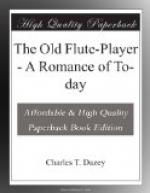Trembling with apprehension, her fingers shaking so that it was with great difficulty that she managed the bag’s clasp, she opened the receptacle, and, with accelerating nervousness which made her feel and fumble, took from it a small box—a jeweler’s box. Slowly she returned to him, her feet dragging as if weighted; slowly, as she stood before him, drooping, frightened, she took off the cover of the little box, her heart hammering till it seemed as if it must burst from her breast; slowly, then, with trembling fingers, while her eyes remained steadfastly downcast and the quick rising, falling, of her delicately rounded, girlish bosom showed how keen her agitation was, she took from the opened box a sparkling trinket.
“You will understand me, father, when I show you—”
She held the brilliant bauble towards him, and, as she stretched out her hand a hundred little facets on the glittering thing caught light, there in the gloomy tenement house room, and blazed and sparkled as with inner fires.
“Look, father.”
The old flute-player stretched a wondering hand to take the trinket. He could not understand, at all, what all this meant. What had the thing to do with her great agitation? How came she with so valuable a jewel? What did it mean—all of it? What under heaven could it mean?
“A ring? Ah,” said he, “it is a beautiful ring set with a diamond. Where did you get it, Anna?” He laid it upon the table quickly. He did not seem to wish to hold it in his hand.
This was the crucial moment and she looked at him with dumb appeal in her fine eyes. Then, seeing nothing in his face to reassure her, she dropped her gaze. Her chest heaved with a quick sob.
“My dear, my dear,” she now began, “I have a great confession. Do not, please, be angry with me, father! I must tell you—”
She was interrupted by a quick, sharp rap upon the door. There was in it the abrupt demand of an official visitation, and it startled both of them.
Hastily she rose and stood gazing at the closed door; wonderingly he rose, also, and, poised, ready to go and open it, waiting a second, to see if there would be a repetition of the knock.
“Who is there?” he called, at length.
“I, Mrs. Vanderlyn,” came the reply, in high-pitched, angry tones.
“M’riar,” the flute-player called loudly, “go to the door.”
Anna, now very plainly much alarmed, cowered back against the table, her face turned toward the door, her two hands back of her, caught desperately on the table and supporting her. Kreutzer looked at her with new alarm—a dreadful apprehension. What could the girl have done to be thus frightened by the coming of the woman whose employment she had left?
“Mrs. Vanderlyn!” the girl gasped, weakly.
Then Kreutzer saw her do a thing which added to his great amazement, his great worry. With a quick stride she crossed the little space between her and the table, quickly snatched from it the box and ring, put the cover on the box, and, hurriedly, with almost furtive gesture, thrust the box into her handbag, being careful, he observed, to see to it that in the bag it was well covered by a handkerchief and veil.




